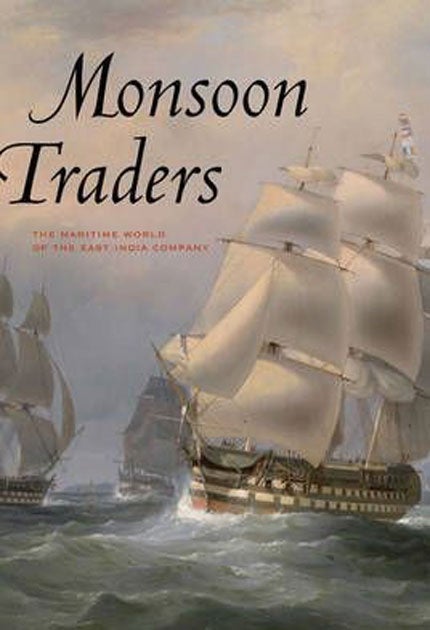Monsoon Traders, By Huw Bowen, John McAleer & Robert J Blyth
Romantic history of the high seas

The East India Company started in the age of Elizabeth I and survived into the reign of Victoria, two-and-a-half centuries later. At its zenith in the late 18th century, it was a key national institution and the most powerful commercial organisation in the world. From its grand Palladian HQ in Leadenhall Street in the City, it ruled over a fifth of the world's population, generated revenues larger than the domestic British economy, and controlled private armies of a quarter of a million troops. It irrevocably altered life in Britain through its mass importing of pepper from the Spice Islands, tea from China and textiles from India.
Yet when it was nationalised in 1858, after the disastrous Indian Mutiny, Punch depicted "John Company" as a joke figure exploded by a mutineer's cannon, its scattered pieces labelled "Misgovernment", "Blundering", "Supineness", "Avarice" and "Nepotism". Its role in British history was relegated to war with the French in India, political triumph in Bengal under Robert Clive, and a reputation for corruption and exploitation – not least for selling opium to China.
Monsoon Traders is not a history of the company. It focuses on the "maritime world": on the ocean, not territory, and on mariners more than governments. Its glory is its superbly reproduced illustrations from the National Maritime Museum, where co-authors Blyth and McAleer are curators. These include East Indiamen under full sail, abundant period maps, a barnacle from a ship's hull, a teapot for testing a consignment on the quayside, and paintings of merchants, captains and ordinary seamen, including Sir Thomas Roe, whom the the company appointed England's first ambassador to the Mughal Empire.
The text judiciously balances the commerce and grind against the romance, excitement and danger of far-flung seafaring. Many ships fell victim to weather, fire, enemy action, piracy or captain's error, although maybe not so many as expected: about one in 20 during 1760-1796. Moreover, as the authors believe, their story resonates with 21st-century concerns about multinational businesses and globalisation.
By the way, the reason the company grew opium in India and sent it illegally to China was to obtain payment from Chinese dealers in silver, a currency acceptable to the imperial Chinese authorities, in exchange for the tea so keenly desired in Britain.
Join our commenting forum
Join thought-provoking conversations, follow other Independent readers and see their replies
Comments
Bookmark popover
Removed from bookmarks